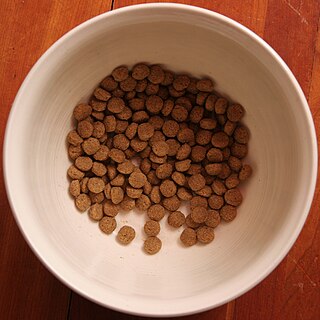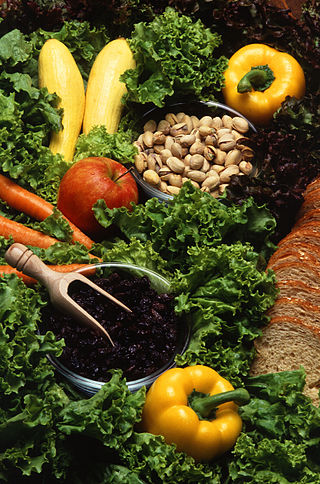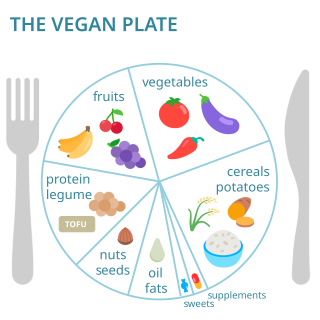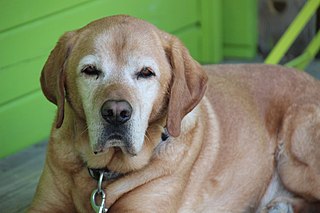The topic of this article may not meet Wikipedia's general notability guideline .(December 2021) |
Vegepet is a line of dietary supplement products for dogs and cats being fed a vegan diet, sold by Compassion Circle. [1]
The topic of this article may not meet Wikipedia's general notability guideline .(December 2021) |
Vegepet is a line of dietary supplement products for dogs and cats being fed a vegan diet, sold by Compassion Circle. [1]
In 2004, a study published in the Journal of the American Veterinary Medical Association evaluated two commercial vegetarian pet foods for nutritional adequacy, which included Vegecat KibbleMix supplement. The study concluded that both Vegecat KibbleMix and the other vegetarian pet food had multiple nutritional inadequacies, particularly taurine, when compared against the AAFCO minimal nutrient profile for cat diets. Vitamin A level leaned high but was still within the AAFCO maximum safe intake. [2] In an apologetic reply, the manufacturer of Vegecat attributed the test results to a manufacturing error during the mixing process and an inaccurate nutrient profile of a food yeast, and said they were taking steps to correct the problems. [3]
Veganism is the practice of abstaining from the use of animal product—particularly in diet—and an associated philosophy that rejects the commodity status of animals. An individual who follows the diet or philosophy is known as a vegan.

A kitten is a juvenile cat. After being born, kittens display primary altriciality and are fully dependent on their mothers for survival. They normally do not open their eyes for seven to ten days. After about two weeks, kittens develop quickly and begin to explore the world outside their nest. After a further three to four weeks, they begin to eat solid food and grow baby teeth. Domestic kittens are highly social animals and usually enjoy human companionship.

Dog food is food specifically formulated and intended for consumption by dogs and other related canines. Dogs are considered to be omnivores with a carnivorous bias. They have the sharp, pointed teeth and shorter gastrointestinal tracts of carnivores, better suited for the consumption of meat than of vegetable substances, yet also have ten genes that are responsible for starch and glucose digestion, as well as the ability to produce amylase, an enzyme that functions to break down carbohydrates into simple sugars – something that obligate carnivores like cats lack. Dogs evolved the ability living alongside humans in agricultural societies, as they managed on scrap leftovers and excrement from humans.

Vegetarian nutrition is the set of health-related challenges and advantages of vegetarian diets.

Cat food is food specifically designed for consumption by cats. As obligate carnivores, cats have specific requirements for their dietary nutrients, namely nutrients found only in meat, such as taurine, arginine, and Vitamin B6. Certain nutrients, including many vitamins and amino acids, are degraded by the temperatures, pressures and chemical treatments used during manufacture, and hence must be added after manufacture to avoid nutritional deficiency.
Raw feeding is the practice of feeding domestic dogs, cats, and other animals a diet consisting primarily of uncooked meat, edible bones, and organs. The ingredients used to formulate raw diets vary. Some pet owners choose to make home-made raw diets to feed their animals but commercial raw diets are also available.

The coat of the domestic dog refers to the hair that covers its body. Dogs demonstrate a wide range of coat colors, patterns, textures, and lengths.

Pet food is animal feed intended for consumption by pets. Typically sold in pet stores and supermarkets, it is usually specific to the type of animal, such as dog food or cat food. Most meat used for animals is a byproduct of the human food industry, and is not regarded as "human grade".
The Nutro Company, Inc., a subsidiary company of Mars Incorporated, is the developer and manufacturer of the Max, Wholesome Essentials, Ultra, Wild Frontier, and Crave brands of dog and cat food, as well as Greenies dental treats. The company is headquartered in Franklin, Tennessee, USA.
Dick Van Patten's Natural Balance Pet Foods is an American pet food manufacturer with its headquarters located in Burbank, Los Angeles, California. Established in 1989 by actor Dick Van Patten, the company markets itself as "Food For a Lifetime" and promotes itself as having "the finest food you can buy for your pet." A subsidiary of Big Heart Pet Brands, it was previously owned by the J.M. Smucker Company until February 2021, when it was sold to Nexus Capital Management LP.

Vegan nutrition refers to the nutritional and human health aspects of vegan diets. A well-planned, balanced vegan diet is suitable to meet all recommendations for nutrients in every stage of human life. Vegan diets tend to be higher in dietary fiber, magnesium, folic acid, vitamin C, vitamin E, iron, and phytochemicals; and lower in calories, saturated fat, cholesterol, long-chain omega-3 fatty acids, vitamin D, calcium, zinc, and vitamin B12.

The developmental life stage of dogs requires a specific intake of nutrients to ensure proper growth and development and to meet energy requirements. Despite the fact that puppies have different nutritional requirements compared to their adult counterparts, of the 652 breeders surveyed in the United States and Canada in 2012, 8.7% report feeding puppies commercial diets not intended for the developmental life stage of canines. Large and small dog breeds have even more specific nutrient requirements during growth, such as adjusted calcium to phosphorus ratio, and as such should receive a breed specific growth formula. Feeding diets formulated by a nutritionist for specific breeds and life stage differences in nutrient requirements ensures a growing puppy will receive the proper nutrition associated with appropriate skeletal, neurological and immune development. This includes nutrients such as protein, fibre, essential fatty acids, calcium and vitamin E. It is therefore important to feed puppies a diet that meets the minimum and/or maximum requirements established by the National Research Council.
Oral disease is one of the most common diseases found in dogs. It is caused by the buildup of various anaerobic bacteria in the mouth which forms plaque, eventually hardening into tartar on the teeth along the gum line, and is related to the development of gingivitis. Since small and toy breeds have a much smaller jaw but contain the same number of teeth, crowding allows higher bacterial build up and puts them at higher risk of developing periodontal disease.
Oral health can be difficult for pet owners and veterinary teams to manage in cats, particularly for pets whose owners are not committed to regular tooth brushing and/or dental treats. Oral disease is common among cats, and may lead to other health issues such as bacterial infections of major organs including the heart, kidneys and liver. When pet owners are aware of the benefits of supporting good oral health in cats, this substantially improves positive outcomes. Dietary selection, along with at-home-dental-hygiene care, allows cat owners to influence the oral status of their pets.
Insect-based pet food is pet food consisting of, or containing insects digestible by pets such as dogs or cats. A limited, but growing number of products are available on the market, including insect-based cat food, dog food, and pet treats.

Senior dog food diets are pet foods that are catered toward the senior or mature pet population. The senior dog population consists of dogs that are over the age of seven for most dog breeds, though in general large and giant breed dogs tend to reach this life stage earlier when compared to smaller breed dogs. Senior dog foods contain nutrients and characteristics that are used to improve the health of the aging dog. Aging in dogs causes many changes to occur physiologically that will require a change in nutrient composition of their diet. A major change that occurs is the decrease in energy requirements which is addressed by lowered caloric content of senior pet foods. Although energy requirements decrease, protein requirements increase as the dog ages. Senior dog foods include a higher protein content as well as highly digestible protein sources to deal with this. Nutrients included for joint and bone health include glucosamine, chondroitin, omega-3 fatty acids as well as two main minerals; calcium and phosphorus. Sources of fiber included in senior dog foods include beet pulp and flax seed as well as fructooligosaccharides (FOS) and mannanoligosaccharides (MOS). These act to increase gastrointestinal health. Brain and cognitive health decline as the dog ages which leads to the inclusion of vitamin E and L-carnitine in senior dog diets to combat this decline. Skin and coat health can also decline in older dogs due to various reasons. The inclusion of linoleic acid as well as vitamin A into senior dog diets helps to improve or maintain the skin and coat of senior dogs. Immune system health is important to maintain in older dogs to prevent the development of various diseases. By including omega-3 and omega-6 fatty acids, vitamin E, β-carotene as well as pre- and pro-biotics, the immune system can be boosted and maintained to help improve overall health.
In general, cognitive support diets are formulated to include nutrients that have a known role in brain development, function and/or maintenance, with the goal of improving and preserving mental processes such as attentiveness, short-term and long-term memory, learning, and problem solving. Currently, there is very little conclusive research available regarding cat cognition as standardized tests for evaluating cognitive ability are less established and less reliable than cognitive testing apparatus used in other mammalian species, like dogs. Much of what is known about feline cognition has been inferred from a combination of owner-reported behaviour, brain necropsies, and comparative cognitive neurology of related animal models. Cognition claims appear primarily on kitten diets which include elevated levels of nutrients associated with optimal brain development, although there are now diets available for senior cats that include nutrients to help slow the progression of age-related changes and prevent cognitive decline. Cognition diets for cats contain a greater portion of omega-3 fatty acids, especially docosahexaenoic acid (DHA) as well as eicosapentaenoic acid (EPA), and usually feature a variety of antioxidants and other supporting nutrients thought to have positive effects on cognition.

As in the human practice of veganism, vegan dog foods are those formulated with the exclusion of ingredients that contain or were processed with any part of an animal, or any animal byproduct. Vegan dog food may incorporate the use of fruits, vegetables, cereals, legumes including soya, nuts, vegetable oils, as well as any other non-animal based foods.

Ulma Doyle Register was an American biochemist, nutritionist, Seventh-day Adventist and vegetarianism activist known for his research on Vitamin B12. He was chairman of the Department of Nutrition at Loma Linda University School of Public Health.